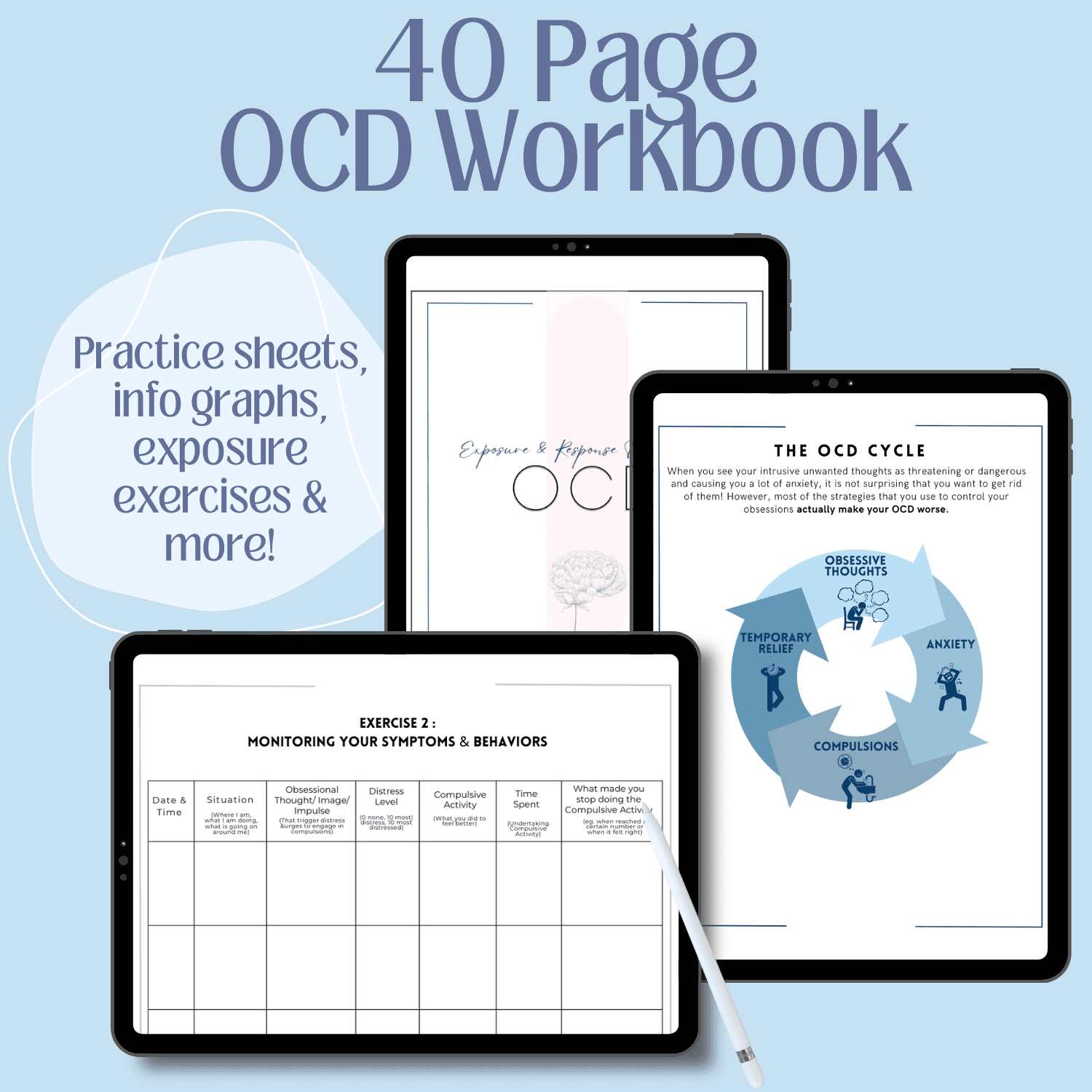PURE O:
Understanding & Treating
the Ever-Elusive OCD Subtype
Ah, the controversial, smoke-in-mirrors OCD Subtype: Pure O, aka Pure O OCD or Pure Obsessional OCD. Pure O is as real and tough as any other form of OCD. It’s time to drag this shadowy figure into the light and give it a good, hard look.
This subtype is sneaky – it hides in plain sight, masquerading as just a bunch of intrusive thoughts without the better-known compulsions associated with OCD like hand washing or neurotic organization. However Pure-O DOES have compulsions, called ‘mental compulsions– you just can’t see them.
What is "Pure O" Type of OCD
‘Pure O’ sounds like it’s all in your head – and that’s exactly where it thrives. But here’s the kicker: it’s not just about thoughts. Those suffering from it are doing mental backflips trying to avoid or neutralize these thoughts. And guess what? Sometimes these mental gymnastics turn into physical actions. So, no, ‘Pure O’ isn’t just a thinking problem – it’s an everything problem.
The Mind Trap: How 'Pure O' Plays You
Rumination
Here’s the cruel joke of ‘Pure O’: the more you try not to think about something, the more you think about it. It’s like your brain is rebelling, doing exactly what you tell it not to. We think we can control our thoughts. Spoiler alert: we can’t. Our brains are wired for problem-solving and threat detection, not for being a calm sea of zen. This leads us to overthinking, re-thinking and repetitive cycles of thoughts.
Dodging Ghosts
Avoidance is the go-to move for ‘Pure O’ sufferers. It’s like trying to dodge a ghost, but every time you dodge, you’re telling your brain that these thoughts are dangerous, and that just makes them come back stronger. It’s a short-term fix that screws you over in the long run. Therapists call this “Anxiety Fuel”– creative, right?
The Quest for Certainty
People with ‘Pure O’ are on a never-ending scavenger hunt for certainty. “What if I’m a bad person?” “What if I don’t really love my partner?” “What if I’m a psychopath?” It’s a hamster wheel of doubt and painful self-analysis. But here’s the harsh truth: this quest for certainty is a trap. It’s fighting a ghost.
Seeking Reassurance from a Lying Brain
Reassurance for someone with ‘Pure O’ is this relentless need for someone to say, “Hey, everything’s okay, your brain is just messing with you.” But here’s the twisted part: every time you get reassurance, you’re actually feeding the OCD beast, making it bigger, badder, and hungrier. It’s a never-ending cycle – the more you seek reassurance, the more you’re trapped in the OCD loop.
Treatment: ERP for Pure O OCD
Exposure and Response Prevention (ERP, EX/RP, or “exposure therapy” is the gold standard for treatment of Pure O and OCD. ERP can feel like voluntarily stepping into a nightmare. You poke and prod those distressing thoughts and images on purpose, but then, you don’t run away.
No reassurance, no compulsions, just you and your fear, eyeball to eyeball. And yeah, there are meds like SSRIs that can join the party and help, but the real heavy lifting? That’s all ERP.
Now, treating Pure-O with ERP is like telling someone who’s been running from their shadow to turn around and chase it instead. It sounds nuts, especially for someone who’s been playing mental whack-a-mole with OCD for ages.
What to Expect During ERP for Pure O
First: Find a therapist you trust and click with. You’re gunna need to know that your therapist has your back and isn’t steering you wrong.
You and your therapist pick out the smaller, less terrifying fears first, sort of like a warm-up. Then, as you get the hang of it, you start taking on the big, ugly fears, building up your tolerance to uncertainty like a mental muscle.
It’s about getting used to the anxiety, like how you get used to cold water in a pool. At first, it’s a shock to the system, but hang in there, and soon it feels like nothing. You’re exposed to tiny bits of your fear, increasing over time, until your brain’s like, “This? This is what I was scared of?”
Facing OCD head on
The real deal with ERP is choosing to stay in the discomfort. It’s about proving to yourself that you’re not gunna be bullied by OCD any longer and that you an take a few hits, but you’re not backing down.
This is where the magic happens. You start feeling like you’ve got a choice, a say in how you respond to OCD’s BS. The big win with therapy comes down to playing the long game. It’s about ditching the quick fixes like avoidance or reassurance, for something way better – freedom from Pure-O.
When you start accepting uncertainty…..that’s when you’ve got OCD beat.
The Bottom Line: You can beat pure o
Pure Obsessional OCD is a sneaky, shape-shifting bastard that makes you doubt everything about yourself. But the key to beating it isn’t to outthink it – it’s to accept the uncertainty and learn to live with the discomfort. It’s about realizing that thoughts are just thoughts, and they don’t get to run your life.
Remember, you’re not alone in this. It’s a fight many are battling, and it’s a fight you can win. So, roll up your sleeves and get ready to fight back. It’s time to take your life back from the clutches of ‘Pure O’.
FAQ's about
Online Therapy for OCD
Q: How long does OCD treatment typically last?
The duration of treatment varies based on the individual’s needs and the severity of their symptoms. Some people might benefit from short-term therapy, while others might require longer-term treatment.
Q: How soon can I expect to see results or improvements?
The timeline for seeing results varies for each individual. Some might notice improvements after a few sessions, while others might require a longer duration. Regular sessions and consistent practice of techniques can expedite progress.
Q: How effective is Cognitive Behavioral Therapy (CBT) for OCD?
CBT, especially a subtype called Exposure and Response Prevention (ERP), is considered the gold standard for treating OCD. Many individuals experience significant symptom reduction after undergoing CBT.
Q: How do I know which therapy is right for me?
Choosing the right therapy often depends on individual needs, the nature of the OCD symptoms, and personal preferences. It’s best to consult with a qualified therapist, like those at Mind by Design, who can provide a personalized recommendation based on an initial assessment.
Q: Can I combine multiple therapies, and if so, which ones work well together?
Yes, many individuals benefit from a combination of therapies. For instance, CBT can be combined with group therapy/peer support, which we often link our clients to as an additional support. The combination often depends on the individual’s needs and the therapist’s recommendations.
Q: How does Ketamine Assisted Psychotherapy help with OCD?
Ketamine has shown promise in treating various mental health conditions, including OCD. As Ketamine therapy providers, we offer this service to help clients break cycles of thinking traps that lead to compulsive behaviors.
Q: Can children and adolescents have OCD?
Yes, OCD can begin in childhood or adolescence. Early diagnosis and treatment are crucial to prevent the disorder from severely impacting a young person’s life.
Q: Are there any resources (books, videos, articles) you recommend for further reading?
Yes, there are numerous resources available for understanding OCD and its treatments. The Mind by Design website offers articles and insights. You can also call us and we would be happy to provide you with referrals. Additionally, books like ‘The OCD Workbook’ and ‘Freedom from Obsessive-Compulsive Disorder’ are great starting points.
Q: Are there different types of OCD?
Yes, OCD can manifest in various ways, including fears of contamination, harming oneself or others, fears of making a mistake, or needing things symmetrical or in a particular order.
Q: Are there any self-help strategies for managing OCD?
While professional treatment is essential, individuals can also benefit from self-help strategies like mindfulness meditation, journaling, and joining OCD support groups.







